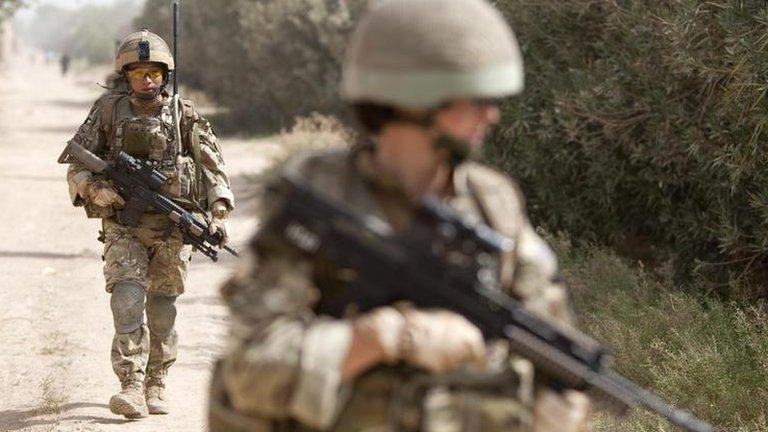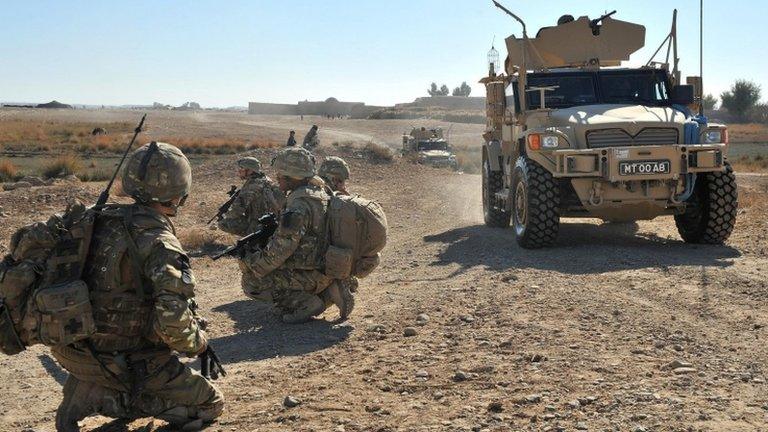Army launches 'rebranding' and recruitment campaigns
- Published
This promotional video features soldiers carrying out duties around the world
The Army is launching a publicity campaign to keep its work in the public eye, following the end of combat operations in Afghanistan.
The "Normal Day" campaign aims to explain to the public the roles the Army fulfils around the world.
It has been launched alongside a recruitment drive, aimed at attracting regulars and reserves. Both campaigns will cost a total of £7m.
Last year the Army only recruited 20 fully-trained reserves.
In its recruiting year 2013/14 it also missed its target for regulars - 6,198 recruits joined the Army, against a target of 9,382.
The rebranding campaign comes after a survey suggested 20% of Britons believe the Army is less relevant now than ever before.
This figure rises to 25% among the Army's core recruitment audience, of those aged between 18 and 34.
When asked what ought to be the Army's current priority, conflict came top with 34%, but when asked what should be a key task only 11% chose humanitarian aid and only 13% suggested it should be disaster relief.
The research was carried out by market research firm OnePoll between 12 and 19 December 2014, among 3,000 adults.
The "Normal Day" campaign will include three documentaries showing real-life examples of the impact that individual Army personnel have made to people's lives in the UK, Kosovo and the Philippines.
And the Army recruitment campaign, conducted under the banner of "More Than Meets The Eye", will see a series of recruitment events being held around the country.

Analysis
By Jonathan Beale, BB defence correspondent
When politicians or organisations choose to "rebrand", you know something's going wrong. In the case of the British army it's the fear that after Afghanistan it'll disappear from the public eye. Its own polling shows most people have no idea what the army does other than fight wars.
With an election coming and more defence cuts on the horizon, the Army is having to work hard to remind people why it's there.
It's a two-pronged campaign. The other target is attracting new soldiers. Recruitment is proving to be difficult too without the drumbeat of war.
Last year the Army only managed to increase the total strength of the reserves by 20 - it was also more than 3,000 soldiers short of its recruitment goal for full time soldiers. These are worrying times for the Army's top brass.

Brig Nick Orr, the Army's head of communications, said the rebranding drive would "improve understanding about what the Army does, but also to showcase the people that make our Army the force it is for good".
He added: "We are proud of the Army's values and role which is absolutely to protect the United Kingdom and fight its enemies, but also to prevent conflict and deal with disaster. While we recognise the clear need to adapt and change with the times, our role and relevance is enduring.
"The Army is as relevant now, if not more so, than ever before amid these incredibly complex times.
"The campaign breaks new ground for the Army and vividly brings to life the many, and often under-recognised, duties it performs across a number of different communities and scenarios."
Maj Gen Chris Tickell, director general of the Army recruiting and training division, said those joining the Army Reserve would experience "a challenge, excitement, the opportunity to travel and a decent salary" to a "world-class standard".
"No matter what your day job, the Army Reserve has something to offer you in your spare time, whether you want to use and improve your existing workplace skills, or try your hand at something completely different.
"You can travel the world, gain qualifications and benefit from confidence and leadership skills that will help you shine in your civilian career."
- Published11 January 2014

- Published3 July 2013

- Published5 July 2012
